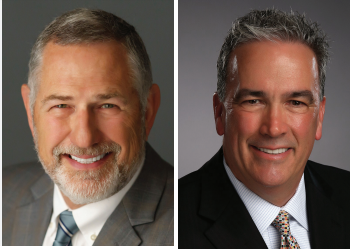Drs. Joel C. Small and Edwin (Mac) McDonald offer advice on handling conflict while reducing stress and improving the team environment.
 Drs. Joel Small and Edwin McDonald discuss decreasing potential conflict
Drs. Joel Small and Edwin McDonald discuss decreasing potential conflict
”Joel, I have a meeting scheduled with one of my assistants tomorrow afternoon. She is continuing to perform poorly, and I am becoming increasingly frustrated. I have trouble with these types of conversations. I apologize for the short notice, but would you have some time today or early tomorrow morning to visit?”
As an executive leadership coach, the above request is common. I am often called upon to help clients prepare for difficult conversations that have the potential for conflict or emotional upheaval. High intensity/high stress conversations create anxiety as well as our tendency to assume the worst possible outcome. Entering a crucial conversation with a high degree of anxiety and a low expectation for a positive outcome will often become a self-fulfilling prophecy.
The best way to reduce the inherent stress of crucial (remedial) conversations and improve their outcome is to adopt a different perspective by reframing the entire experience. For example, I often ask my clients to imagine that they are a coach of a competitive sports team. A coach’s job is to ensure that they put the best possible team on the playing field. They do this by providing the knowledge, training, and support for creating a peak performing team. They also must ensure that their players support each other so the team can function at its best. No individual player, no matter how talented, is more important than the team, or indispensable. Too often we do our team a disservice by assuming that a certain staff member is indispensable even though they are disruptive and destabilizing.
Putting the best possible team on the playing field is a commitment that every successful coach makes to his or her players, and we, as practice leaders, must make the same commitment to our teams.
Practice leaders find themselves in a unique position due to their dual role as a team member and team coach. This critical distinction alters the dynamics of remedial conversations with disruptive team members.
My clients have found that they can greatly reduce the inherent anxiety associated with these remedial conversations when they speak both for the team and as a team member rather than for themselves. By doing so, they sense that they are serving a higher calling while fulfilling their obligation to the team and delivering on their commitment to having the best possible team. Furthermore, when speaking for the team you are making a clear statement that a disruptive team member’s behavior is not a personal issue with you. Instead, you are emphasizing how their aberrant behavior is negatively affecting the entire team.
Having a team-oriented approach when taking corrective action with staff will prove to be more impactful and have a better chance of achieving the desired results. Often, we tend to personalize the negative effects of a staff member’s poor attitude or performance. We see their behavior as a personal affront, and we increase the anxiety because of what we perceive as an impending contentious discussion. Frequently, our anxiety will either make us become overly emotional and/or aggressive or we will “sugar coat” the message making it ineffective. Either of these two scenarios will produce results that are less than desirable by sending the wrong message to the offending person.
Seeing ourselves as the team spokesperson removes the personal nature from the encounter and allows us to view it as a conversation as opposed to conflict. Adding basic coaching skills by remaining curious and utilizing powerful questions will further diminish the potential conflict.
Clients that successfully reframed their role as a team spokesperson and utilize basic coaching skills have reported decreased anxiety and better results when confronted with corrective conversations with team members. They sense that making this change in perspective increases their leadership skill and improves how the staff views them as their team leader.
Handling conflict could mean refining the office culture. Read “Peak performance is a byproduct of our practice culture,” by Drs. Small and McDonald here: https://endopracticeus.com/peak-performance-is-a-byproduct-of-our-practice-culture/
Stay Relevant With Endodontic Practice US
Join our email list for CE courses and webinars, articles and more..

 Drs. Joel C. Small and Edwin (Mac) McDonald have a total of over 75 years of dental practice experience. Both doctors are trained and certified Executive Leadership Coaches. They have joined forces to create Line of Sight Coaching, a business dedicated to helping their fellow dentists discover a better and more enjoyable way to create and lead a highly productive clinical dental practice. Through their work, clients experience a better work/life balance, find more joy in their work, and develop a strong practice culture and brand that positively impact their bottom line. To receive their free ebook, 7 Surprising Steps to Grow Your Practice Through Leadership, go to
Drs. Joel C. Small and Edwin (Mac) McDonald have a total of over 75 years of dental practice experience. Both doctors are trained and certified Executive Leadership Coaches. They have joined forces to create Line of Sight Coaching, a business dedicated to helping their fellow dentists discover a better and more enjoyable way to create and lead a highly productive clinical dental practice. Through their work, clients experience a better work/life balance, find more joy in their work, and develop a strong practice culture and brand that positively impact their bottom line. To receive their free ebook, 7 Surprising Steps to Grow Your Practice Through Leadership, go to 